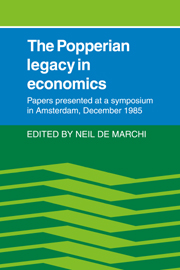Book contents
- Frontmatter
- Contents
- Preface
- List of contributors
- Introduction
- Discussion
- Part I Popper as a philosopher of science
- Part II Popper among the economists
- Part III Falsification and trying to do without it
- 5 The case for falsification
- 6 John Hicks and the methodology of economics
- Part IV The missing chapter: empirical work and its appraisal
- Part V Non-Popperian perspectives on economics
- Index
5 - The case for falsification
Published online by Cambridge University Press: 05 January 2012
- Frontmatter
- Contents
- Preface
- List of contributors
- Introduction
- Discussion
- Part I Popper as a philosopher of science
- Part II Popper among the economists
- Part III Falsification and trying to do without it
- 5 The case for falsification
- 6 John Hicks and the methodology of economics
- Part IV The missing chapter: empirical work and its appraisal
- Part V Non-Popperian perspectives on economics
- Index
Summary
The preceding title and subtitle, as formulated by the authors of the draft program, seem to correspond reasonably well with what I have discovered that I want to say. But a little further clarification may not, perhaps, be superfluous.
Any significant case for adopting, or “striving after,” a methodological principle must rest ultimately on some ethical, moral, or political argument (as Popper emphasized in the debate with Habermas and elsewhere). Insofar as methodological principles are critical principles, then, the criticism they contain, or imply, must rest on some kinds of normative standards or presuppositions. Moreover, I would like to emphasize, at the start, how closely the real questions of economics, much more than is the case with any other subject, scientific or otherwise, are constantly and intimately involved with controversial political, indeed party-political, issues, an involvement that gives rise to persistent and perennial problems in applying economic knowledge to policy.
Anyhow, it is with such ultimate ethical or political meta-arguments for the (or a) falsification and falsifiability principle that this chapter is concerned.
I want to start from, and take as far as it will go, Professor Johannes Klant's analogy or comparison between the methodological principles of economics and the “rules of the game.” Personally, however, I would not want to emphasize at all appreciably the two definite articles.
- Type
- Chapter
- Information
- The Popperian Legacy in EconomicsPapers Presented at a Symposium in Amsterdam, December 1985, pp. 169 - 182Publisher: Cambridge University PressPrint publication year: 1988
- 11
- Cited by

